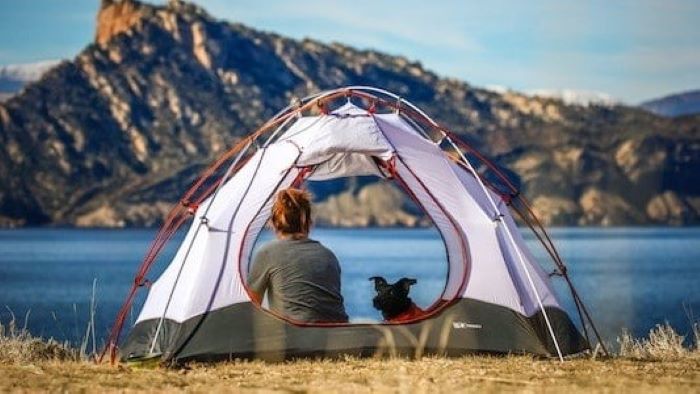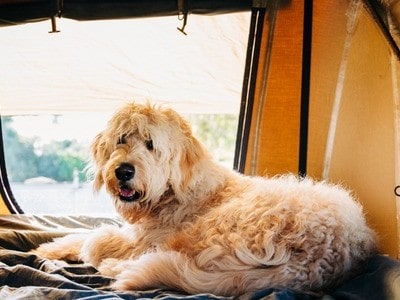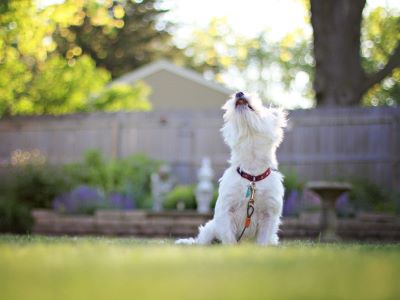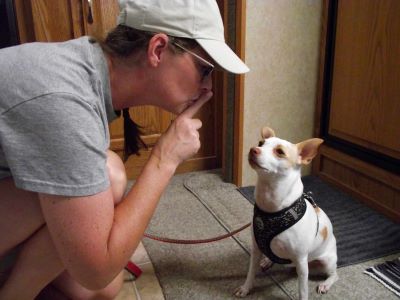Camping is fun, those fun activities and beautiful views with our family and furry friends. But things go down when the dog does not stop barking for some reason, so you wonder “How to stop dogs from barking when camping?”⛺
Worry not, in this article we are going to learn how to handle dogs’ barking when you are out in the camp doing adventures. So, without further ado let’s start this journey.🐶

How To Stop Dogs From Barking When Camping?
Dogs may bark due to excitement, or alertness, or sometimes, it’s their way of saying, “Hey, this place is mine!” Recognising these triggers is our first step towards a pleasant camping experience.⛺
Sometimes, barking is their way of telling us something is wrong.
"It might be a strange noise, an unfamiliar scent, or even a thorn in their paw. Paying attention to subtle signals helps us understand when our dog's barking🐶 is more than just a nature, it's a call for attention or comfort", says experts at PetMD
Recognising the fine line between occasional barks and disruptive noise ensures we address the issue without denying our dog’s instincts. Let’s see more tips to stop dogs from barking when camping:
1. Pre-Camping Preparation
Socialising your dog with new faces and outdoor environments builds their confidence, making them less likely to bark consistently when surrounded by nature.
Ever seen a dog confused by a tent? It’s a sight! Familiarity is key, from tents to sleeping bags, transforming these into part of their territory eases their camping jitters.⛺

Just like us, a dog needs to be in shape for an adventure. A pre-camping vet visit ensures your furry friend is physically fit. Mental enthusiasm? That’s where stimulating activities, puzzle toys, and a dash of pre-camping walks come into play. A tired dog is a happy camper and a quieter one too!
When selecting a tent for camping with your dog, choose one that is roomy enough for both of you. Some of the best tents for camping with dogs allow space for a dog bed or crate so your pup stays comfortable.
2. Choosing a Suitable Camping Spot
A site that strikes a balance between sharing the camping love with fellow humans and maintaining a respectful distance from wildlife is the goal.
- Look for sites that boast open arms for dogs. From spacious pitches to dog-friendly trails, these campsites are a wagging tail away from paradise.
- Designated dog-friendly areas within campsites are gems waiting to be discovered. These zones are prepared with your dog’s needs in mind, offering safe spaces to play, explore, and maybe even make new friends.
- Leash regulations, quiet hours, and waste disposal guidelines are your dogs. Take a stroll around the campsite to check out potential challenges and delights. 🐶
- Bring along your dog’s favourite blanket, water bowl, and a few familiar toys. A touch of home in the great outdoors makes the transition smoother for your furry friend.
Consider proximity if you’ll be driving to the campsite. Check our tips on how to travel with a dog to make the road trip easier on your four-legged friend
Your dog may be a social butterfly, but not everyone is a fan. Respect your fellow campers’ space, and if your dog does engage in friendly introductions, ensure it’s welcomed on both ends of the leash.
3. Positive Reinforcement Techniques
Imagine teaching your dog the art of camping⛺ manners through a system of applause and goodies, that’s positive reinforcement in action! It’s like giving them a high-five for being the best camper on the block!
Treats,🍬 praise,👏 and toys🧸: It’s the trio of happiness!
Dogs are fluent in the language of tone. When praising, infuse your voice with joy and excitement. Your dog will bask in the glory of your positive vibes.

A special camping toy becomes the trophy of good behaviour. Whether it’s a squeaky ball or a plush companion, this toy signifies that your dog is a champion camper.
Consistency is the key to teaching them the steps of good behaviour. When your dog behaves admirably, shower them with positive reinforcements[1]. On the flip side, if they venture into unwanted behaviour territory, the secret is to withhold the applause and goodies. Dogs are quick learners.
Remember, Timing is everything. Instantly reward good behaviour to help your dog🐶 connect the dots between their actions and the delightful consequences.
Positive reinforcement is like sprinkling a bit of magic into your camping adventure, stock up on treats, get ready to shower praise, and let the positive camping⛺ vibes flow!
4. Behavioural Corrections
To curb excessive barking, think of redirection as gently guiding towards pleasant behaviour. Let’s understand in detail:
- When your dog starts a spontaneous barking, offer an alternative focus, perhaps a favourite toy, a treat-filled puzzle, or a game.
- Commands and signals become your script, guiding your dog. Teach them a specific command for quietness, like ‘hush‘ or ‘enough.’ Combine it with a hand signal. When the barking begins, gracefully cue your command, and with a little practice, your dog will learn.
- Start with gentle exposure to camping sounds in a controlled setting. Gradually increase the volume and variety, pairing each sound with positive experiences like treats or playtime.
- Begin behavioural corrections in a calm, non-stressful environment. Early training lays the foundation for a well-behaved dog in camping. Be consistent in your commands and redirection efforts.
- Dogs thrive on routine, and a consistent approach helps them understand the rules of the camping game. Combine behavioural corrections with positive reinforcement. When your dog responds well, reward them with treats or praise. 🐶
- This reinforces the connection between good behaviour and positive outcomes. Behavioural changes take time.

Be patient and understanding. Celebrate small victories and progress. So, gear up, cue the commands, and let the camping⛺ adventures begin.
5. Providing Comfort and Distraction
Camping,⛺ it's a bit like a holiday for your dog but in nature's backyard. Ensuring your dog is comfortable is the first step to an adventure. Set up their sleeping area with familiar bedding, and if your dog has a favourite blanket, bring it along.
Pack their favourite toys, the squeaky ones, the tug-of-war champions, or that trusty chew toy. Familiar scents provide a comforting touch for your dog.🐶
Pack a fleece blanket or insulated dog bedding depending on the low temperatures. Refer to the guidelines for how cold is too cold for dog camping to ensure your dog stays warm and comfortable.
Camping isn’t just about the physical outdoors, it’s an adventure for the mind too. Bring along puzzle toys that dispense treats or engage in a game of hide-and-seek with their favourite toy. Mental stimulation not only keeps boredom at bay but also turns camping into a fun time.
Camping with your dog is more than just sharing a tent, it’s about crafting a haven of comfort and joy. By prioritising your dog’s needs for familiarity, entertainment, and mental stimulation, you’re not just camping, you’re creating lasting memories of a shared adventure.
6. Respectful Communication with Other Campers
Think of your dog as the friend everyone is excited to meet at the camping party. Before the festivities begin, extend a friendly introduction.

- Address concerns before they turn into camping problems. Maybe your dog has a quirky habit, or perhaps they’re a tad too enthusiastic during sunrise, share these details.
- Proactive communication transforms concerns into shared responsibilities, fostering a pleasant camping place.⛺
- Introduce them early, share a bit about their personality, and open the door for friendly exchanges.
- If concerns arise, view them as puzzles to solve together. Maybe there’s a compromise or a simple adjustment that can turn a potential issue into a non-event.
- Pick up after your dog, stick to leash rules, and show that being a pet-friendly camper means being a responsible one.
- Camping is a shared adventure, and communication is the glue that binds the camping community together.
Can Dogs Be Trained Not to Bark?
Barking is a natural form of communication for dogs, but excessive or disruptive barking can be addressed through training. Identify why your dog is barking.
Is it due to boredom, fear, excitement, or a protective instinct? Understanding the root cause is crucial for effective training. Remember, training takes time and patience. Follow the above tips and be patient.

How Can I Calm My Dog Down in a Tent?
Before your camping adventure,⛺ set up the tent in your backyard and let your dog explore it. Allow them to sniff around, enter, and get comfortable.
Familiarity breeds comfort, and this step helps reduce any tent-related anxiety. These familiar items provide a sense of security.
Create a calming bedtime routine in the tent. This could include a short walk, followed by some quiet time with your dog inside the tent. Consider using calming scents like lavender, chamomile, or a dog-friendly pheromone spray inside the tent[2].
This positive association encourages your dog to view the tent as a safe and enjoyable space. If it’s your dog’s first time in a tent, introduce them gradually. Start with short periods inside the tent during the day, gradually increasing the duration.
Teach your dog relaxation commands such as "settle" or "calm." Use these commands inside the tent and reward your dog for complying. Over time, they'll associate these commands with a state of calmness.🐶
Remember, each dog is unique, and it may take some trial and error to find what works best for your dog.
FAQs
❓What Is the Best Command to Stop a Dog From Barking?
Be sure to not yell it, just firmly say it. You’ve taught your dog to bark on cue so it’s a controlled bark. This will make it easier for them to stop when you give the “Quiet” command. If they keep barking just wait them out till they stop.
❓Do Dogs Get Tired of Barking?
Dogs do not get tired of barking. The act of barking makes your dog want to bark more. Barking is a self-reinforcing dog behaviour, which means that the act of barking makes your best friend feel good. Other self-reinforcing behaviours, where the reward is the behaviour itself, are chewing and chasing.
❓How To Stop Dogs From Barking When Camping?
One easy way to put an end to your dog barking while camping is to give them something more exciting to focus their attention on. If you have a dog that is food-driven, a tasty chew or an enrichment toy stuffed with something tasty can take their attention away from foot traffic, other campers, or the local wildlife.
❓Should You Ignore the Barking Dogs?
Many dogs will bark to get your attention, ask for food, or tell you to open the door or let them out of the crate. Don’t respond. Wait until your dog is quiet to give them what they want.
❓Why Does a Dog Bark for Hours?
Attention Seeking: Dogs often bark when they want something, such as going outside, playing, or getting a treat. Separation Anxiety/Compulsive Barking: Dogs with separation anxiety often bark excessively when left alone.
Conclusion
In conclusion “How to stop dogs from barking when camping?” Understand the root of your dog’s barking. Train, socialise, and mentally gear up your dog for camping.
Choose for dog-friendly campsites. Shower your dog with treats, praise, and toys for good behaviour and watch them transform. In the camping community, being a responsible pet owner isn’t just about following rules, it’s about creating a wagging, happy place for all.
Remember, you’re not just camping,⛺ you’re crafting memories of a lifetime. Happy trails, happy tails!
Reference:
- Positive reinforcement training | The Humane Society
- The Effect of Pet Remedy on the Behaviour of the Domestic Dog | NIH



